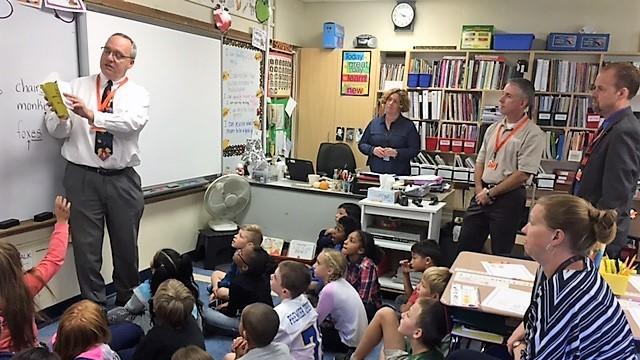Every October for the past 10 years, members of the Newington Rotary (Connecticut, US – D 7890) have put a dictionary in the hands of third graders at all four Newington public elementary schools and the students attending Emmanuel Christian Academy.

That’s a total of more than 4,000 dictionaries that students have, and can continue to use, to develop their writing and reading skills enabling them to become resourceful learners.
“It’s become a sort of ritual of the fall season for us to implement this worthwhile service project,” says Rotarian David Johnson, who co-chairs the annual project along with Rotarian Robert Randich.
“The kids return back to school in September and within a month third grade teachers begin to focus on curriculum that centres on the basics of reading and writing skills,” he adds, noting that educators see third grade as the dividing line between learning to read and reading to learn.
Johnson and Randich, along with Rotary president Mike Turgeon and vice president Dave Tedeschi, visited four classrooms at the Anna Reynolds School to personally distribute the books.
Randich, an attorney, former Newington mayor and now a probate judge for the Newington district, takes the lead in the classrooms by explaining the importance of literacy to the students, emphasising that supporting education for all children and literacy for children and adults is a major focus of Rotary clubs throughout the world.
Randich also enlightens the students about Rotary and the many community service projects it sponsors.
Rotarians talk to students about the strides made in nearly eradicating polio and providing clean water and sanitation throughout the world, projects supported by local Rotary clubs through an affiliation with Rotary International.
“We inform them about our local ventures to collect food for the needy at Thanksgiving time and raising funds for organisations like the Alex’s Lemonade Stand Foundation, adds another element to the education process promoting their responsibility to be community-minded,” explains Randich.
Johnson says that once the students have learned how to properly use the dictionary, they will be able to take them home where they become part of the learning process away from the classroom.
Based on the feedback Rotarians have received since first introducing the dictionary giveaway project to Newington schools in 2007, they’ve been assured that students will revisit their dictionaries for at least five years at which point they can move on to a more elaborate edition suitable for middle school.
Rotary purchases the books from The Dictionary Project, a national non-profit whose mission is to ensure that everyone will be able to enjoy the benefits of owning a dictionary.
Since being founded in 1995, this national organisation has made it possible for over 29 million children worldwide to get a dictionary with the help of more than 10,000 sponsors like Rotary clubs who take on the task of getting the job done.
Jonas Roberts, a teacher in one of the third grade classrooms visited, believes a dictionary is more than a book of words.
“A dictionary kindles the fire for the love of words and from a love of words a passion for reading and writing,” he says.
Further, he notes that expanding and enriching students vocabulary is an important goal in third grade, and the dictionary is not only a tool to find and define words, but inspires students to find other words we have not covered in class.
“Connecticut history is a large part of our year in social studies, and students love learning that Connecticut’s very own Noah Webster wrote America’s first dictionary and it continues to be published to this day,” he adds proudly.
Rebecca Voisine, another third grade teacher, thanks Rotarians for reaching out and providing students with a very useful resource.
“The dictionaries you provide give students access to word meanings, word families, pronunciations, parts of speech and so much more,” she remarks.
“It also provides an alternative to digital learning, which is important when we consider exposing our students to both print and digital resources and show them how to balance between both.”
Shoving aside any notion that today’s students rely more on Google searches and other computer search engines to bolster reading and writing skills, Roberts reply is simple: “Technology has its place, but so does a good and faithful dictionary.”
Rotarians agree.
Source: Hartford Courant





